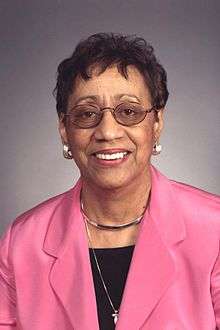Maxine Horner
Maxine Horner was one of the first African American women to serve in the Oklahoma State Senate, serving from 1987 to 2005, along with Vicki Miles-LaGrange.[1] Horner held the position of Democratic Caucus Chair, as well as Chair of Business and Labor and Government Operations, and Vice-Chair of Adult Literacy.[2]
Senator Maxine Horner | |
|---|---|
 | |
| Member of the Oklahoma Senate from the 11th district | |
| In office 1986–2004 | |
| Personal details | |
| Born | 1933 Tulsa, Oklahoma |
| Political party | Democratic |
| Residence | Tulsa, Oklahoma |
| Alma mater | Wiley College, Langston University |
Biography
Horner was born in Tulsa, Oklahoma in 1933. She graduated from Booker T. Washington High School, attended Wiley College in Marshall, Texas and received her BA from Langston University. She was married to the late Donald M. Horner and they have two children, Shari Tisdale, and Donald M Horner Jr. She has several grandchildren; her first grandchild, Corey Tisdale, was a political staffer for Congressman Dan Boren.
Horner was elected to the Oklahoma State Senate in 1986 and served for over 18 years until 2005, when she retired due to term limits. During her time in office, she played a major role in passing legislation that created OHLAP, the Oklahoma Higher Learning Access Program, which funds scholarships to Oklahoma colleges for students from families that earn $50,000 or less in income.
Some committees Horner served on include Business and Labor (Chair), Government Operations (Chair), Adult Literacy (Vice Chair), Appropriations, Education, Tourism, Congressional Redistricting, Rules and Tourism.
Credited with legislation founding the Oklahoma Jazz Hall of Fame, she is best known for her commitment to education and the arts. Horner was inducted in the Oklahoma Women's Hall of Fame in 2007, the Oklahoma Afro-American Hall of Fame in 1999, and received the Pinnacle Award from the Tulsa Mayor's Commission on the Status of Women on 1993.[3]
References
External links
- Women of the Oklahoma Legislature Oral History Project -- OSU Library
- Voices of Oklahoma interview. First person interview conducted on November 14, 2019, with Maxine Horner.